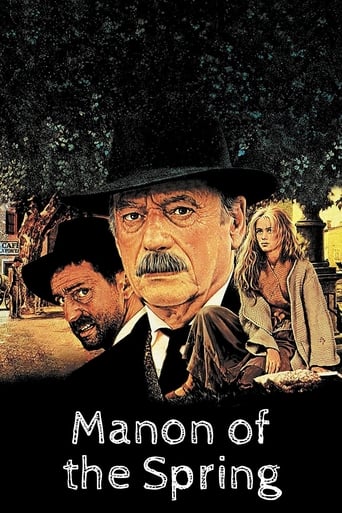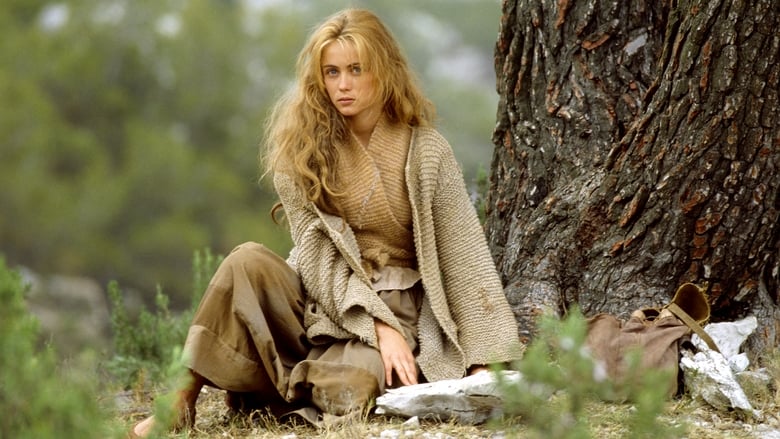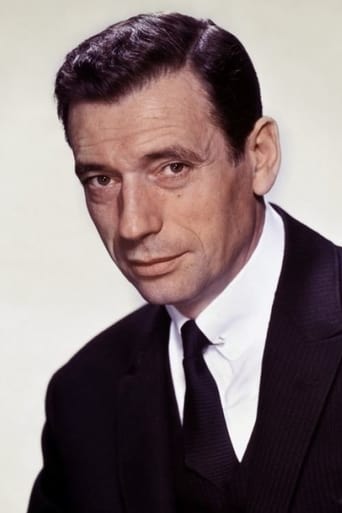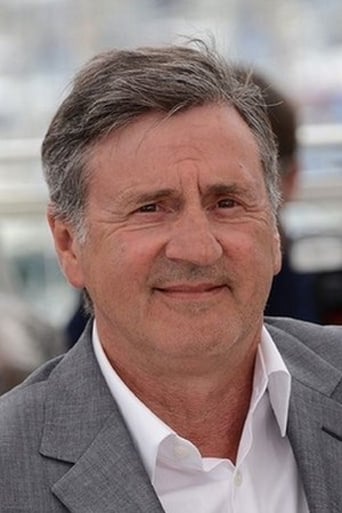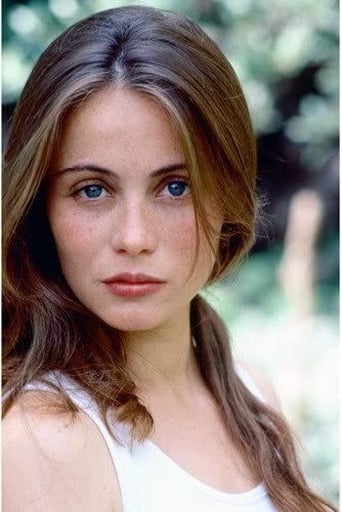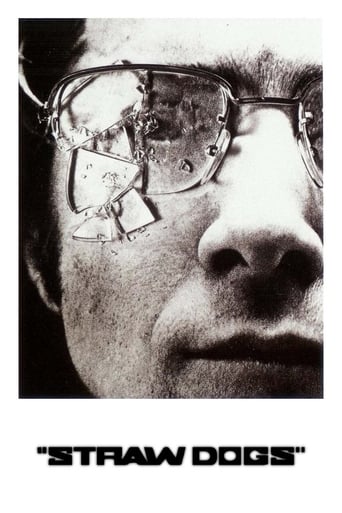Manon of the Spring (1987)
In this, the sequel to Jean de Florette, Manon has grown into a beautiful young shepherdess living in the idyllic Provencal countryside. She plots vengeance on the men who greedily conspired to acquire her father's land years earlier.
Watch Trailer
Free Trial Channels
Cast


Similar titles
Reviews
Too much of everything
A bit overrated, but still an amazing film
It's easily one of the freshest, sharpest and most enjoyable films of this year.
It is encouraging that the film ends so strongly.Otherwise, it wouldn't have been a particularly memorable film
Jean de Florette and Manon of the Spring are more closely related than an original and sequel; they are really parts 1 and 2 of the same film, and in fact were filmed back to back.Set in Provence around 1920 (most people still use horses, donkeys and mules, but there are a few autos around; telephones exist but are rare, the mayor is very proud to have one), the first film tells of Jean de Florette (Gerard Depardieu,) a rather intellectual bourgeois civil servant from the city who, having inherited a farm in Provence, moves his wife Aimee (Élisabeth Depardieu, Gerard Depardieu 's real life wife at the time) and ten year old daughter Manon there, with the intention of applying scientific principles to raise vegetables and rabbits. But in the arid climate of Provence, everything depends on water: there is a plentiful spring on the property but Jean doesn't know it because his neighbors, local worthy Cesar "Le Papet" ("Gramps") Soubeyran (Yves Montand) and his rather dim nephew Ugolin (Daniel Auteuil) have blocked it up, hoping that the lack of water will cause the farm to fail, so they can buy it cheap. This tactic has tragic consequences for Jean's family. The second film recounts how ten years later Manon, now a beautiful young woman, finds both the spring and a way of revenge for what was done to her family. In the end, everyone gets more or less their just desserts.The films have an interesting history. French writer and director Marcel Pagnol, whose play Marius was latter turned into the French film trilogy Marius/César/Fanny, which was itself remade into the 1962 Hollywood film Fanny with Leslie Caron and other big stars, made a film in 1953, Manon des Sources, telling the second part of the story; his final cut of over four hours was so drastically cut by the distributor that Pagnol disowned it, and later redid the same story as a novel, adding a prequel novel, Jean de Florette; these two books together became the basis for these films.Jean de Florette and Manon of the Spring were a huge success both commercially and critically, and it's easy to see why. The Provencal settings are meticulously detailed and the landscape photography luscious. The acting is all around excellent: Gerard Depardieu and Yves Montand especially are as good as they've ever been.These films are not perfect works of art: they are not free of sentimentality, some viewers may occasionally be confused about exactly who some of the minor characters are, and the surprise ending ties together all the loose ends so neatly that it may see rather artificial. But these are minor flaws. All in all, this is a production that I think everyone will like: it's one of those rare films that leave you with memories that seem to be of people and places you've experienced rather than seen on a screen.
One is so saddened by the cruelty shown in "Jean de Florette" one would think any sympathy for the two men would be impossible. Manon, the daughter of the cruelly treated hunchback, has stayed behind and is living with an old woman. She is utterly beautiful. Ugolin, who has done her great harm, falls madly in love with her, after he sees her bathing in the nude in a little pool in the rocks.. His uncle, his co-conspirator in the manipulation of the spring in the first movie, wants him married so he can carry on the family name. However, he is not an attractive man and she is both frightened and repulsed by him. She watched him dig up their concrete, releasing the water they had trapped, shortly after the death of her beloved father. Manon gets her revenge by finding an underground source for the water and bringing fear and drought to the population that had wronged her family for no reason. the whole community is beside itself and she blames the two men in the public square as they desperately try to go on. The acting is so precise and believable. The movie is so tight and so terse that we are in on every moment. And we learn that decent men sometimes do terrible things. What an outstanding movie.
When I saw Jean de Florette, I thought that Yves Montand jumped at the chance to play the role of Cesar Soubeyran (aka "Le Papet"), but he actually refused the role when first offered and only took it when his wife died. I have to wonder if he got the scripts for both movies or the first one, since in Manon of the Spring his character actually deepens and might be even more interesting to play (albeit not quite as villainous, he really does have an arc here), but at the same time the story dips somewhat in quality. It's not for the entire running time of the film - mostly it's in the third act, when the film turns into an unbelievable yarn full of revelations and twists to make it into a happy story of the utmost redemption (with maybe a bit of tragedy in retrospect to be sure). But Manon of Spring shows why having a strong ending, especially when a story runs from first part to second almost four hours in length, is very important.This time it's more about the 'legacy' of the Soubeyrans as it's 10 years later and, for reasons not made totally clear, the daughter of Jean (de Florette) is on her own as a shepherdess (her mother, also for reasons not totally clear, is singing opera again, which is odd since in the last film she said she couldn't do it anymore, but whatever). As she goes about her daily routine the Soubeyran nephew Ugel, played by Daniel Autreil, notices her going about her business (indeed, at one point, very nude and dancing around), and he falls in love with her. Of course falling in love is tantamount for him, even as his uncle demands that he marry and continue the family blood-line.Of course there is a lot of emotional baggage for the maybe 18 year old Manon (Emmanuele Beart, pretty much immaculate in beauty to the point I'm guessing that's why they hired her, some talent notwithstanding), and the question one asks is not so much if she'll take revenge on the wealthy people who drove her father to die and make her family sell the home via trickery with the spring, but when, and by what methods. This is also, of course, a PG movie and done in a classical style, so it would have to come from something much trickier. How she lays out her payback is really clever and makes for a compelling second half of the film (or maybe one quarter I should say) and it ends up involving most of the town itself.I think that with this story this time what's so effective is Berri's direction as a contrast in style with the material; this could very well be like a (semi-romantic) western set in the French countryside, with a lot of wide landscapes and greenery and land that can be walked around on, and while it's shot with an eye for beauty and the music scoring compliments it, the emotions are rather dark and twisted underneath. Autiel is still the actor who still has some complex emotions to play, but here it's not really about deception of this Florette farm-owner but about whether or not (or how soon/what to say) to ask this woman to be his wife and have his kids... which seems pretty close to impossible. Autiel is still very good, but somehow the character isn't quite as complex this time as in the first film - rather the whole dynamic is hinged upon what Manon knows and what he doesn't.It's not really Beart's fault that she doesn't get much to play here, but I wonder if Manon was better developed or had more to do in the book this is based on. Part of it is that she's supposed to be shy, but to this extent(?) I think this adds to what comes out as the over-wrought melodrama at times - she either looks concerned or cries through much of the film, maybe once or twice she has some joy to her - so it leaves her as kind of a not badly but slightly underwritten character. On the opposite side Montand does everything he can with what's he's given to do and makes this old man very sympathetic as he comes to grips with what he's done. A lot has to happen for that to really take place, but Montand is always there, even when (maybe especially when) the script lets him down with what amount, to me, to be soap opera revelations about lineage and who is really who in this story (if you can take a guess it might almost count as a spoiler... maybe).Manon of the Spring carries a lot of terrific craftsmanship, natural and wonderful acting, and some colorful supporting characters (well, maybe the real suitor for Manon is kind of two-dimensional, if that). I just wish the last 20 minutes weren't so disappointing.
A beautiful but shy shepherdess (Emmanuelle Béart) plots vengeance on the men whose greedy conspiracy to acquire her father's land caused his death years earlier.Directed by Claude Berri, it is the second of two films adapted from the 1966 two-volume novel by Marcel Pagnol, who wrote it based on his own earlier film of the same title. It is the sequel to "Jean de Florette".I wish I could say I got into this film, but I just did not. This was probably my fault and not the fault of the film, just not being in the right mood for it. So my middle-level rating should only be seen as preliminary. Most likely it would go up upon a second viewing.

